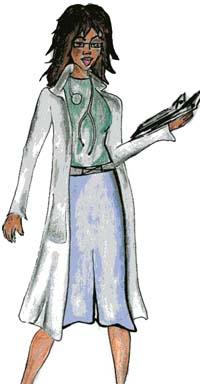 As women, we constantly feel as though we are pulled in a thousand directions at once. We have career responsibilities, relationships, children and homes for which we are responsible, among dozens of other jobs. Many times we sacrifice our own health in order to satisfy the other duties within our life.
As women, we constantly feel as though we are pulled in a thousand directions at once. We have career responsibilities, relationships, children and homes for which we are responsible, among dozens of other jobs. Many times we sacrifice our own health in order to satisfy the other duties within our life.
We should remember that our health is just as important as any of our other responsibilities and be certain to give our bodies the care and attention they need.
May is Women’s Health Care Month. Why not do yourself and your loved ones a favor and schedule an appointment with your doctor and have some important annual screenings done? Make sure that your doctor checks you for all of the most important medical problems that face women today. Seven tests every woman should be certain to have on a regular basis include:
Pap smear
The American Cancer Society predicts that an estimated 11,150 women will be diagnosed with cervical cancer in 2007. Early detection and intervention can prevent this form of cancer from becoming untreatable. While not every case is treatable, yearly pap smears will give those who do develop cervical cancer the best chance at treatment and survival. These tests should begin as soon as a young woman becomes sexually active or by the time she turns 18 years old, whichever comes first, and then be given annually.
Pelvic exams
Another important yearly test for women is a pelvic exam. This test allows your doctor to detect abnormalities of the ovaries, fallopian tubes and other reproductive organs. More than 80,000 new cases of gynecologic cancer are diagnosed each year. Pelvic exams are the best chance at early detection and treatment of these potentially fatal cancers.
Mammograms
Breast cancer is the number two cancer-related killer of women today. An estimated 178,840 new cases of breast cancer will be diagnosed in 2007, according to the ACS, and more than 40,000 women will die from this disease. Monthly self-exams can help you detect any lumps or abnormalities, but your best defense against breast cancer is a yearly mammogram. Experts recommend that every woman over the age of 40 receive a yearly mammogram, while those over the age of 20 should begin monthly self-exams.
Cholesterol testing
Most don’t know that heart disease is the number one killer of women in the United States. With an estimated 500,000 deaths attributed to heart disease each year, the health of your heart should be a serious cause for concern. Beginning at age 20, you should have cholesterol screenings every five years, and these should increase to yearly at the age of 45 or if your doctor determines that you are part of a high-risk group. Just by staying aware of your cholesterol numbers and keeping them under control, you can reduce your risk of dying from heart disease.
Bone density scan
Osteoporosis is a debilitating disease that affects more than 55 percent of the US population aged 50 and older, according to the National Osteoporosis Foundation. Of these cases, more than 80 percent are women. The National Institute of Health recommends that women aged 65 and older have a bone density scan done at least once every 5 years. Your doctor can determine if you should begin screenings earlier due to risk factors, or if you should have screenings done more frequently.
Colorectal screening
A surprising number of people look at colon cancer as a disease that strikes men, exclusively. However, the reality is that, according to the ACS, more women are diagnosed with and die from colorectal cancer each year. The key to preventing fatalities from this type of cancer is early detection. A routine fecal occult blood test every year, along with more invasive procedures as your doctor deems necessary, can detect potential problem polyps before they turn into cancer. Screenings should start at age 50 in an average risk individual or at 40 if colorectal cancer has been detected within family members in the past.
Skin cancer checks
The Skin Cancer Foundation states that melanoma is the deadliest form of skin cancer and it is the third leading form of cancer among women aged 20 to 39. Regular self-checks of your skin, coupled with a yearly skin cancer screening, can allow early detection and treatment of skin abnormalities and cancers, possibly preventing death from the more severe forms. Professional screenings should begin at age 30 and can even begin younger if you are within a high-risk group.
You and your doctor can discuss these tests and screenings to determine the frequency that you will need to be checked due to risk factors and family history. Your physician may recommend other screenings for you, as well. Be certain to follow any advice or recommendations given by your doctor and always remember to take care of yourself, as well as your other responsibilities. Many people are depending on you, as a woman, and you need to be able to depend on your own body, as well.
These are tests you should be aware of all year round. But this May, as the focus is on you and your health, be sure to take good care of you by asking your doctor, scheduling appointments, researching the information and staying healthy!
